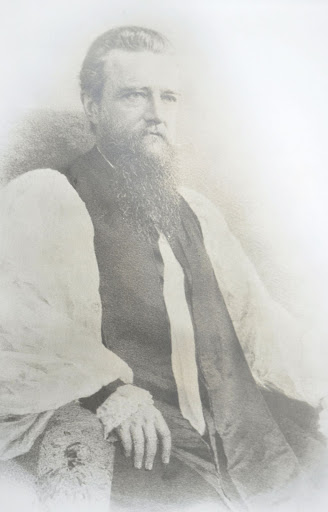The second bishop of Georgia, John Watrous Beckwith, said of the Episcopal Church, “She is simply a true Branch of the one Holy Catholic and Apostolic Church—the Church of the Living GOD—the Pillar and Ground of the Truth! She dare not be less; she cannot be more.”
 Born 1831 in Raleigh, North Carolina, Beckwith graduated from Trinity College, Hartford, Connecticut in 1852. He served in North Carolina and Maryland before joining the staff of Confederate General William J. Hardee at the start of the Civil War.
Born 1831 in Raleigh, North Carolina, Beckwith graduated from Trinity College, Hartford, Connecticut in 1852. He served in North Carolina and Maryland before joining the staff of Confederate General William J. Hardee at the start of the Civil War.
Beckwith wrote from Atlanta of being a chaplain in a letter to his wife dated June 26, 1864, “I have asked Hardee for a candid opinion as to the ability of a Missionary to do work in the Army while this Campaign is going on, and he tells me it is simply impossible …. He says that if the men were brought together for service it would at once attract the attention of the enemy who would open fire upon us … and cause a useless sacrifice of life. He therefore advises me to confine my operations to the Hospitals, for nothing can be done here outside of his Staff.”
He was serving as the Dean of the cathedral in New Orleans at the time of his election. Bishop Beckwith was consecrated as Bishop of Georgia on April 2, 1868 in St. John’s Church, Savannah. On May 16, 1889, he gave what was by far the longest Bishop’s Address in the history of our Diocese. The 22-pages of text was long even by the standards of the day. He read into the minutes, as was required by canon, his daily calendar of activity since the last convention. This takes up the first six pages. The bishop then launched into a defense against the introduction of “Romish” doctrines through practices such as having lit candles on the altar for communion, wearing a chasuble, reserving the Blessed Sacrament, and other practices now considered traditional in the Diocese he led from 1868-1890.
 The lengthy address might have been easier on the ears than we first imagined. The Rev. Dr. Jimmy Lawrence in writing a history of the Diocese of Georgia in the early 1900s put it, “His wonderful voice, bringing out the full meaning of the services, at once arrested the attention of his hearers. When Bishop Beckwith read, people listened. His oratory in the pulpit attracted large congregations wherever he went, and the course of his episcopal visitations was like a royal progress.”
The lengthy address might have been easier on the ears than we first imagined. The Rev. Dr. Jimmy Lawrence in writing a history of the Diocese of Georgia in the early 1900s put it, “His wonderful voice, bringing out the full meaning of the services, at once arrested the attention of his hearers. When Bishop Beckwith read, people listened. His oratory in the pulpit attracted large congregations wherever he went, and the course of his episcopal visitations was like a royal progress.”
Beckwith served as Bishop of the Episcopal Diocese of Georgia for 23 years during the difficult period of reconstruction. He led expansive growth across the state in starting new congregations. In his final annual report in Milledgeville in May 1890, he told the convention delegates, “I have not for years looked forward to the future with as much hope as now….All over the Diocese, among clergy and laity, there seems to be an increase in aggressive work on churchly lines.”
One strange, but true story is the 300-page book Beckwith published that was briefly a bestseller in Atlanta. The book was the evidence in the trial to depose the Dean of the Cathedral who had earlier been dogged by rumors that he was John Wilkes Booth. An article is online here: Unremembered Atlanta – An assassin’s grave in Atlanta?
